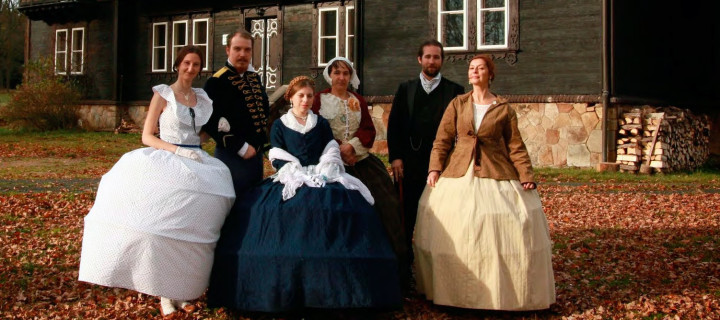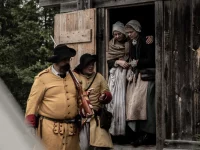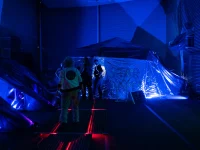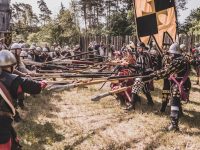Man will vanquish by his will and reason over the nature. He will understand that he is mortal that he has now hope for resurrection and he will accept death and he will accept it with satisfaction. He will be as God and eve- rything will be allowed to him and as soon as man becomes God any law will cease to apply. Everything will be allowed!
Breaking Dawn at a Moscow Villa
Skoro Rassvet was a Czech larp for fifteen people using topics from the history and literature of 19th century Russia. The design project strived to create an atmospheric “all inclusive” repeatable larp (players get the game in a ready-to-run packaged weekend experience) with seven hours of emotionally and intellectually intense immersive gameplay.
The game was full of personal existential dramas on the background of social and cultural changes of the era. The players enacted detailed and mutually entangled characters from the Russian aristocracy during a small household celebration in the year 1855, shortly after the Crimean War. The dramatic arcs of the individual roles were designed as tense opportunities for meaningful personal transformations mirroring the global dimensions of both historical and cultural clashes of modernity with tradition.
To an outside observer, it may seem that the game was aiming at material and cultural authenticity. Nevertheless, it was more of a gently molded theatrical illusion and a carefully constructed interactive abstraction from Dostoyevsky and Tolstoy books and Chekhov plays.
The historical background was utilized as a meaningful reference frame for the plots and material culture of the game, where the chosen themes, sub-stories and characters from the books were reconstructed into new, yet still recognizable forms that were the real moving forces behind the dramatic animation.
To Create a Cultural Experience of the “Other”
The main design challenge was to create a both sensual and reflective experience of the “cultural other” in the scaffolding of an interpersonal drama larp. The atmospherical elements of the game; like costumes, cuisine of the period, combat pistols, glasses of vodka and verbally abundant toasts, also had their substantive place in the game’s interactions mechanics.
 They were designed as extra-diegetically minimalist, following the Nordic larp tradition, which stresses the overlaps of the abilities of the characters and players. The aim was to connect each background element of the setting with an opportunity to act. Cultural references weren’t just a static frame.
They were designed as extra-diegetically minimalist, following the Nordic larp tradition, which stresses the overlaps of the abilities of the characters and players. The aim was to connect each background element of the setting with an opportunity to act. Cultural references weren’t just a static frame.
The game provided the frame for living in a Russian novel through the scripted plots (based mainly on mutual character conflicts). But they were meant to feel more like a frame of possibilities to play from personal interpretation of the game topics, than at set of instructions.
Different game layers were meant to create synergic effects able to elicit and maintain the atmospheric and effective bodies of the story so the players could seamlessly concentrate on the creation and perception of the individual game experience for themselves and each other.
The managing of the game development used some external stimuli and a basic frame of scripted events, but the main dramatic action was facilitated by players themselves; by their own mutual mediation of conflicts, resolutions or kind-hearted agreements and sharing of thoughts.
The enactment of a dramatic game, ie. the timing, was in the player‘s hands. The freedom of play was ensured by five organizers, playing silent servants (muzhiks), who managed the household (mainly taking care of the food and drinks) and who could, through this diegetic presence, maintain an indirect influence on the game itself and perceive its heartbeat.
Teaching to Believe in God, Czar and Russia
For this almost self-managed gameplay, the background and how-to-play workshops were a crucial part of the larp event. They took more time then the game itself and went through small interactive lectures to theatrical enactment of pregame scenes.
The players were encouraged to play the game on the borders of immersive (from feeling and experience) and dramatic (for the visible dramatic gesture) role-playing. Rassvet was in its core an extended conversational chamber larp, but the workshops enabled and taught players to live the small everyday moments as the dramatic ones, so they were able to enjoy the game in the “silent” natural pauses of their own drama cycles.
The content of the workshops led the players through brief historical facts, where the focus was more on the mentality and lifestyle rather than political history. The triad of values – God, Czar and Russia were amplified through the workshops so that the player could feel comfortable with their character‘s position on these values and in the best scenario, could portray their own philosophical life reflections in the language of the game.
An interesting level of the game and one of the design challenges was creating gameplay of the everydayness of the Russian Orthodoxy religion and private family life.
There was no direct religious authority and we wanted players to breathe in the religious thinking and behavior, to feel the Dostoyevsky stress of religion as a moral structure, but did not want the religious themes to dominate the game.
Religion was then designed mainly as a cultural background source, but an entangled source – the opportunity and constraint to act at the same time. At the end it definitely was a part of many in-game conversations, where the religious notions served as tools for the social world structure and borders exploration through the contrasts of eternal and temporal orders of reality. The players had to consume a lot of background information, but to the surprise of organizers, the explicit feedback just for these parts of the experience was generally very positive.
Beyond Talking – Living in the Book Itself
Rassvet was not a static club of talking intellectuals, the philosophical content was actually more enacted by the gameplay itself than in abstract words due to its theatrical origins. The universal (or at least in the Eurocentric sense universal) values and entanglements of human life hanging in the larger net of specific strong sociocultural constraints were “materially present” in the air.
 The collective shared representations, partly existing in the players‘ minds and partly in the organic, the enacted instance of social order constructed a reference frame in which small gestures and accidentally overheard words could be highly meaningful. This was one of the most interesting emergent effects of the game; the players often created their own encounters transcending seamlessly the initial design of character relations and drama opportunities.
The collective shared representations, partly existing in the players‘ minds and partly in the organic, the enacted instance of social order constructed a reference frame in which small gestures and accidentally overheard words could be highly meaningful. This was one of the most interesting emergent effects of the game; the players often created their own encounters transcending seamlessly the initial design of character relations and drama opportunities.
It was usually not by their own dramatic reflection and action, but through the intuitions of immersive feeling of the enacted role. From this moment and on, there was a stable layer of “living” the game content instead of just “playing”. In almost every game, there were players who reported strong after-effect experiences. Individual player experiences of course significantly differed based on their own immersive capacities and habits, but the main effect was not only a personal emotional experience. The players felt that they were a part of an organic story, and the game immersion got to the collective level.
For all this – huge credit belongs to the literary sources of Russian classics, which are truly masterpieces of combining everyday problems with the universal dimensions of human life. As Sigmund Freud said, Dostoyevsky was without doubt one of the greatest psychologists of the 19th century, and this praise could probably be extended to many other authors of that time and space. To play the game, it was not necessary to have a personal reading experience with Russian 19th century novels, but the players who had were able to achieve wonders with seamlessly taking the fiction beyond any explicit game design. As one of them said:
… it was like living in the book itself
The characters of the game were written with detailed interpersonal relations, their selves were not given by their ego description, but were described as dramatic transactions with other characters and shared life events. The game core event contained an encounter of three interconnected families, where many characters shared life forming histories. Nevertheless, the game design stressed brief dramatic sketches more than rich written novel-style personal history.
Role descriptions briefly portrayed what the character had done and how, but usually not exactly why – this was open to the player‘s interpretation. To familiarize the player with the mood and fate of a character, they were also framed emotionally by specific music. During the game no mood enhancing extra-diegetic instruments were used, but prior to the game and at the finale Russian folk music was used as atmospheric background. Many players were able to connect their game experience with the music, and it helped them to position the whole larp deeper into the depicted cultural context.
Technique – Synergic Combination of the Known
To balance the appraisal of the game and its principles, it should be said that the game design itself was an organic process and even after almost 10 runs, it is not easy to assess whether the game was intended like that from the beginning and how it just happened that way during the year and half of the creation process. Behind the larp was a diverse team of six people, who joined their forces just for this project.
Many layers and details are a product of distributed process of co-creation – writing Skoro Rassvet was a special and spontaneous experience itself. From its beginnings, the project aimed at the form innovation – it wanted to explore the medium format game, which is strongly based on real cultural background. It wanted to translate the cultural experience of the specific “other” and prepare a game, which utilizes larp fun as a means for transformative learning experience.
That was successful, but moreover, something new was discovered in the process. The treasure of larp innovation does not lie in one new technique, but in a precise synergic combination of the known.
Rassvet has been praised by its players exactly for that – for soft and many interconnected layers of content, which enable slow but deep and gradual immersive journey to the story-scape where, in the roots, is the life itself.
Skoro Rassvet
Credits: Martin Buchtík, Sarah Komasová, Petr Platil, Markéta Haladová, Tomáš Hampejs, Jaromír Vybíhal
Location: Hunting villa Vacíkov, Czech Republic
Length: 12h worskhops, 7h game
Players: 15 players (7 men, 8 women), 5 organizers per run (7 runs in total)
Budget: €700 (for each run)
Participation Fee: €50
Game Mechanics: Dramatic/immersive play, play to lose, 360° aspiration, pre-written characters
Website: http://rassvet.cz/
This article was initially published in The Nordic Larp Yearbook 2014 which was edited by Charles Bo Nielsen & Claus Raasted, published by Rollespilsakademiet and released as part of documentation for the Knudepunkt 2015 conference.
Cover photo: The family of Derevyanskiy in front of their family villa. (Play, Martin Buchtík). Other photos by Martin Buchtík.







